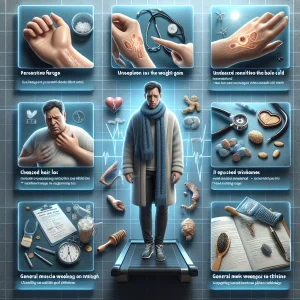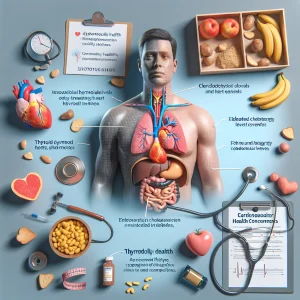In-Depth Analysis of Health Risks Associated with Hypothyroidism in Men
Hypothyroidism in men poses a serious health challenge that occurs when the thyroid gland, situated in the front of the neck, does not produce sufficient levels of crucial thyroid hormones. The two primary hormones involved are thyroxine (T4) and triiodothyronine (T3), which are essential for regulating a multitude of bodily functions such as metabolism, energy levels, and overall physical well-being. Although hypothyroidism can affect individuals of any gender, men may face unique difficulties related to this condition. Understanding these specific challenges is vital in order to manage symptoms effectively and receive appropriate treatment, ultimately ensuring that men can maintain their quality of life and overall health.
Gaining a comprehensive understanding of hypothyroidism is critical for effective treatment and management. Many men may overlook or misinterpret symptoms as simple fatigue or stress, blaming them on their hectic lifestyles or the aging process. Such misconceptions can lead to prolonged discomfort and potentially serious health complications. Early detection of hypothyroidism is imperative; recognizing symptoms at an early stage allows for timely interventions that can significantly improve health outcomes and enhance overall well-being.
A variety of factors can trigger the onset of hypothyroidism, including autoimmune disorders such as Hashimoto’s thyroiditis, specific medications, or complications arising from radiation therapy. Early identification of these symptoms is crucial for initiating appropriate intervention strategies that can ultimately lead to improved health and a better quality of life.
Essential Knowledge for Men Regarding Hypothyroidism
- Hypothyroidism results from the insufficient production of thyroid hormones, which can cause a range of physical and mental health challenges in men.
- Common physical symptoms include persistent fatigue, unexplained weight gain, thinning hair, and muscle weakness, along with increased risks for high cholesterol, heart disease, and diabetes.
- Psychological effects may manifest as depression, anxiety, and cognitive difficulties, severely impacting a man’s quality of life.
- This condition can also adversely affect sexual health, resulting in diminished libido, erectile dysfunction, and fertility challenges.
- Weight management becomes particularly complex for men, as low thyroid hormone levels can decelerate metabolism, making it harder to achieve or maintain a healthy weight.
 Identifying the Physical Symptoms and Health Risks of Hypothyroidism
Identifying the Physical Symptoms and Health Risks of Hypothyroidism
The physical symptoms associated with hypothyroidism can differ significantly from one individual to another. Men experiencing this condition frequently report chronic fatigue, unanticipated weight gain, heightened sensitivity to cold, and muscle weakness. You might find yourself feeling unusually exhausted despite getting a full night’s sleep or struggling to maintain or lose weight, even when adhering to a healthy diet and regular exercise routine.
Such symptoms can lead to self-doubt regarding your health and lifestyle choices. Additionally, hypothyroidism can present itself in less obvious ways, such as dry or pale skin and increased hair loss. Addressing these symptoms promptly is essential for effective management and restoration of health. Recognizing and acknowledging these changes can facilitate timely medical consultations and appropriate interventions.
Moreover, hypothyroidism may result in a slower heart rate, contributing to feelings of lethargy and decreased stamina during physical activities. The cumulative effects of these symptoms can significantly obstruct daily life and functionality. Therefore, if you suspect that hypothyroidism may be impacting your health, seeking medical advice is absolutely essential.
Understanding the Mental and Emotional Challenges Associated with Hypothyroidism
The mental and emotional repercussions of hypothyroidism are frequently underestimated, yet they deserve considerable attention. As thyroid hormone levels decline, you may experience mood fluctuations, intensified feelings of depression, and increased anxiety. These emotional shifts can result in irritability and fatigue, potentially straining personal relationships and diminishing overall satisfaction with life.
Research has illustrated the intricate connection between thyroid function and mental health, emphasizing the necessity of acknowledging this relationship for effective management. Cognitive decline is another area of concern, with individuals often describing experiences akin to “brain fog.” You might struggle to concentrate, forget everyday tasks, or feel mentally sluggish, particularly in situations that require quick thinking and clarity.
Recognizing these cognitive and emotional hurdles is vital for advocating for suitable medical treatment. For more comprehensive information regarding the relationship between hypothyroidism and mental health, consider exploring resources provided by the Mayo Clinic, which offers valuable insights.
 The Significant Impact of Hypothyroidism on Men’s Sexual Health
The Significant Impact of Hypothyroidism on Men’s Sexual Health
Hypothyroidism can profoundly affect men’s sexual health, leading to various complications. Reduced levels of thyroid hormones may contribute to decreased libido, erectile dysfunction, and potential infertility. You might notice a significant drop in your interest in sexual activity or face challenges in achieving or sustaining an erection.
These sexual health issues can be distressing, fostering feelings of inadequacy, frustration, and anxiety within intimate relationships. The hormonal imbalances caused by hypothyroidism can also disrupt testosterone levels, complicating the already multifaceted nature of sexual health. Low testosterone often results in heightened fatigue, emotional instability, and diminished sexual desire, creating a difficult cycle that can be challenging to break.
Engaging in open conversations with your healthcare provider regarding these sexual health concerns is essential. Exploring effective treatment options can assist in restoring both thyroid function and sexual health, promoting a holistic approach to overall well-being.
Effective Strategies for Managing Weight in the Context of Hypothyroidism
Weight management often proves particularly challenging for men diagnosed with hypothyroidism. The reduced metabolic rate typically associated with low thyroid hormone levels can significantly hinder your ability to lose or maintain a healthy weight. Even with a consistent exercise regimen and balanced nutrition, you may find it exceedingly difficult to shed excess pounds.
This ongoing struggle can result in feelings of frustration and hopelessness regarding weight management. Understanding the connection between hypothyroidism and weight gain is vital for crafting effective strategies. Collaborating closely with a healthcare provider can help you develop a personalized plan that targets both thyroid health and weight management goals.
This collaborative approach might include adjusting medications, modifying dietary habits, and implementing specific exercise routines designed to enhance metabolism while considering your energy levels.
 The Intriguing Link Between Hypothyroidism and Cardiovascular Health Risks
The Intriguing Link Between Hypothyroidism and Cardiovascular Health Risks
The relationship between hypothyroidism and cardiovascular health is a significant concern for men diagnosed with this condition. Insufficient thyroid hormone production can lead to elevated cholesterol levels, increasing the risk of heart disease over time. It’s crucial to understand that the fatigue and lethargy often associated with hypothyroidism may not just be symptoms of the disorder but could also indicate underlying cardiovascular issues requiring medical attention.
Regular cardiovascular evaluations are essential for individuals with hypothyroidism. Your healthcare provider may recommend implementing lifestyle changes, including adopting a heart-healthy diet rich in fruits, vegetables, whole grains, and lean proteins. Additionally, participating in regular physical activities that align with your energy levels can bolster thyroid function and enhance cardiovascular health. By proactively managing both thyroid function and cardiovascular fitness, you can significantly mitigate the potential for further health complications.
Assessing the Impact of Hypothyroidism on Male Fertility
Fertility challenges represent a critical aspect of hypothyroidism in men. Low thyroid hormone levels can disrupt the delicate hormonal balance essential for proper sperm production and overall reproductive health. If you are encountering difficulties in conceiving, it’s vital to consider how your thyroid function may be influencing your fertility journey.
Effectively treating hypothyroidism can not only enhance your overall health but also increase the chances of successful conception. Collaborating with a knowledgeable healthcare provider who understands the complex relationship between thyroid function and fertility is crucial to developing a comprehensive approach that addresses both issues. This may involve routine monitoring of hormone levels through blood tests and making necessary adjustments to medications to optimize reproductive health.
Holistic Approaches to Effectively Manage and Treat Hypothyroidism in Men
Successfully managing hypothyroidism necessitates a holistic approach that encompasses regular monitoring through blood tests, medication management, lifestyle modifications, and open dialogue with healthcare professionals. Blood tests play a vital role in diagnosing hypothyroidism, measuring key indicators such as Thyroid-Stimulating Hormone (TSH) and T4 levels. Elevated TSH levels often indicate an underactive thyroid, while low T4 levels confirm the diagnosis.
Upon diagnosis, treatment typically involves hormone replacement therapy with synthetic thyroid hormones like levothyroxine. This medication aids in restoring normal hormone levels and alleviating many symptoms associated with hypothyroidism. Regular follow-up appointments are essential for assessing treatment effectiveness and making any necessary adjustments based on blood test results.
In addition to medication, lifestyle changes—such as adopting a nutrient-rich diet supportive of thyroid health that includes adequate iodine, selenium, and zinc—can be beneficial. Engaging in consistent exercise that matches your energy levels can also help manage symptoms while enhancing overall wellness. By actively participating in your health management through education, collaboration with healthcare providers, and lifestyle adjustments, you can lead a fulfilling life despite the challenges posed by hypothyroidism.
Common Questions and Answers About Hypothyroidism in Men
What is hypothyroidism in men?
Hypothyroidism in men refers to a condition characterized by insufficient production of thyroid hormones by the thyroid gland, leading to a slowdown in metabolism and various health issues.
What are the typical symptoms of hypothyroidism in men?
Common symptoms of hypothyroidism in men include persistent fatigue, unexplained weight gain, cold sensitivity, dry skin, constipation, muscle weakness, and symptoms of depression.
How is hypothyroidism diagnosed in men?
The diagnosis of hypothyroidism in men is made through blood tests that measure levels of thyroid-stimulating hormone (TSH) and thyroxine (T4) in the bloodstream.
What causes hypothyroidism in men?
The primary cause of hypothyroidism in men is frequently Hashimoto’s thyroiditis, an autoimmune disorder. Other contributing factors can include thyroid surgery, radiation treatment, and certain medications.
What are the treatment options available for men with hypothyroidism?
Men diagnosed with hypothyroidism typically receive treatment through synthetic thyroid hormone medications, such as levothyroxine, to replace deficient hormones and restore normal thyroid function.
Can hypothyroidism lead to additional health complications in men?
If left untreated, hypothyroidism in men can result in complications such as heart disease, fertility issues, and mental health challenges. Timely treatment is essential to mitigate these risks.
This Content Is Sponsored By: Thyroid Testing UK
The article titled Hypothyroidism in Men: The Impact On Health was originally published by https://bloodtest.co.uk
Find Us On Facebook: EZ Blood Tests
The article Hypothyroidism in Men: Exploring Health Implications appeared first on: https://ezbloodtest.com
The article Hypothyroidism in Men: Exploring Health Implications was found on https://limitsofstrategy.com



